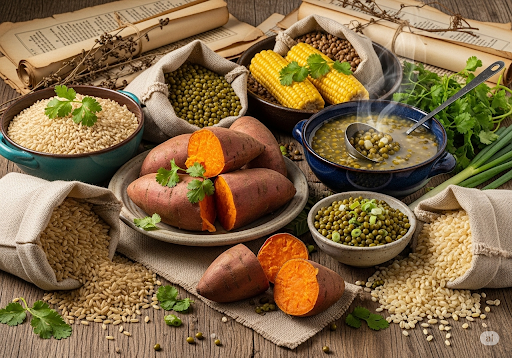With the advent of summer, many people who lose weight replace all the white flour of polished rice with whole grains such as brown rice and corn. However, over-reliance on whole grains may damage the spleen and stomach, and the more you eat, the more deficient you become.
Our country has had the habit of eating whole grains since ancient times.》 “American Herbal Pharmacopoeia” records that mung beans have the effect of “replenishing, harmonizing the five internal organs, calming the spirit, and traveling through the twelve meridians”, and believes that it is “good for making cakes and roasting food”. Sweet potatoes, which were called sweet potatoes in ancient times, were not only able to “tonify deficiency, replenish qi and strength, strengthen spleen and stomach, and strengthen kidney yin” but were also a frequent visitor to people’s dining tables.》 There is a record in the “Compendium of Materia Medica” “southern people use (sweet potato) as rice, grain, and fruit, and it is delicious when steamed and roasted”.
Modern research has also found that coarse grains are rich in dietary fiber compared to refined rice noodles, which can promote intestinal peristalsis, prevent constipation, and reduce the risk of colorectal cancer; are higher in vitamins and minerals, especially B vitamins, magnesium, zinc, etc.; are hypoglycemic index foods, which help control blood sugar; and have a strong feeling of satiety, which is beneficial for weight management.
Excessive consumption hurts the spleen and stomach
Long-term consumption of only whole grains may damage the spleen and stomach. The high fiber content in coarse grains makes it more difficult to digest than refined rice noodles.
For people with weak spleen and stomach function, such as postoperative patients and the elderly and infirm, excessive consumption of whole grains may increase the burden on the gastrointestinal tract, which in turn can cause uncomfortable symptoms such as abdominal distension and abdominal pain.
How to consume correctly
The “Dietary Guidelines for Asian Residents (2022)” points out that healthy adults can consume 200 to 300g of cereals every day, including 50 to 150g of whole grains and beans, and 50 to 100g of potatoes.
Children and the elderly with relatively weak spleen and stomach function should appropriately reduce the amount on this basis, and can also make coarse grains to reduce the burden on the gastrointestinal tract.
However, it should be noted that in order to improve the taste, do not add a large amount of flour, starch, cream, sugar, etc. to the whole grain, and also avoid using the fried method to make the whole grain as a whole grain snack.
In addition, the increase in the intake of whole grains should be done step by step, and if consumed in large quantities suddenly, it may cause intestinal discomfort reactions.
